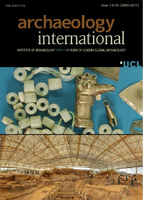
Archaeology International
Scope & Guideline
Connecting researchers and ideas in the heart of London.
Introduction
Aims and Scopes
- Interdisciplinary Approaches in Archaeology:
The journal encourages the integration of various disciplines, including anthropology, history, and environmental science, to provide a holistic understanding of archaeological findings. - Cultural Heritage and Conservation:
A significant focus on the preservation and interpretation of cultural heritage, emphasizing the role of archaeology in informing heritage management practices. - Fieldwork and Excavation Reports:
Publication of detailed accounts of archaeological fieldwork, showcasing new findings and methodologies applied in various excavation projects. - Public Engagement and Education:
Highlighting initiatives that promote public interest in archaeology, including educational programs, community involvement, and outreach activities. - Critical Reflections on Archaeological Practices:
Encouraging discussions that challenge traditional archaeological narratives and methodologies, fostering a critical and reflexive approach to the discipline.
Trending and Emerging
- Community-Based Archaeology:
There is a rising interest in projects that involve local communities in archaeological research, emphasizing collaboration and the co-creation of knowledge. - Environmental Archaeology:
A growing trend towards understanding past human-environment interactions, with studies focusing on climate change, sustainable practices, and ecological impacts of ancient societies. - Digital Archaeology and Technology:
The incorporation of digital tools and technologies in archaeological research, including GIS, 3D modeling, and remote sensing, is increasingly prevalent in recent publications. - Social and Political Dimensions of Archaeology:
Emerging themes that explore the social implications of archaeological findings, including issues of identity, power dynamics, and the politics of heritage. - Reflections on Archaeological Ethics:
A notable increase in discussions surrounding ethical considerations in archaeology, including repatriation, cultural sensitivity, and the responsibilities of archaeologists to both communities and the academic field.
Declining or Waning
- Traditional Artifact Studies:
There appears to be a noticeable reduction in articles focused solely on the analysis of specific artifact types without broader contextualization or interdisciplinary approaches. - Purely Historical Narratives:
Papers that focus on straightforward historical accounts or narratives without integrating archaeological data or contemporary relevance have become less frequent. - Regional Studies with Limited Scope:
Research focusing exclusively on narrow geographic regions without comparative or global perspectives seems to be declining, as the journal shifts towards broader, more integrative studies.
Similar Journals
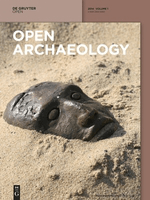
Open Archaeology
Innovative Research for a Global AudienceOpen Archaeology is a distinguished open-access journal dedicated to publishing high-quality research in the fields of archaeology, conservation, and education. Since its inception in 2015, the journal has established itself under the esteemed publication of DE GRUYTER POLAND SP Z O O, experiencing rapid growth and recognition, culminating in a Q1 ranking in both Archaeology and Conservation categories as of 2023. Based in the vibrant academic environment of Poland, Open Archaeology caters to a global audience, illustrated by its Scopus rankings which position it 16th in Conservation and 69th in Archaeology, showcasing its significant impact in the arts and humanities sphere. The journal aims to foster interdisciplinary discourse and disseminate innovative research findings to enhance understanding and preservation of cultural heritage. With an unwavering commitment to open access, it encourages widespread dissemination of knowledge, making it an invaluable resource for researchers, professionals, and students alike.
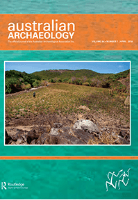
AUSTRALIAN ARCHAEOLOGY
Exploring the Depths of Australia’s Past.AUSTRAILIAN ARCHAEOLOGY, published by Taylor & Francis Ltd, is a leading academic journal dedicated to the field of archaeology. With a strong reputation as evidenced by its Q1 ranking in both the Arts and Humanities and Social Sciences categories, this journal fosters the growth and dissemination of pioneering research from diverse archaeological contexts. The journal has been a vital resource for scholars and practitioners since its convergence in 2002, supporting the collective advancement of knowledge in the archaeological discipline. By offering a platform for rigorous analysis and critical discussions, AUSTRAILIAN ARCHAEOLOGY appeals to a wide audience, from established researchers to students beginning their journey in archaeology. Although it is not an Open Access journal, the insights provided are invaluable for enhancing understanding and appreciation of Australia’s rich archaeological heritage. With a Scopus ranking that places it among the top contenders in its field, this journal continues to contribute significantly to outstanding archaeological scholarship and professional practice.
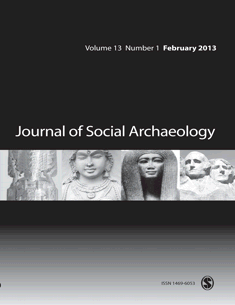
JOURNAL OF SOCIAL ARCHAEOLOGY
Revealing the Intersections of Culture and CommunityJOURNAL OF SOCIAL ARCHAEOLOGY, published by SAGE Publications Ltd, stands at the forefront of interdisciplinary research where archaeology meets social science. With an ISSN of 1469-6053 and an E-ISSN of 1741-2951, this esteemed journal provides a platform for investigation into the social dimensions of past human behaviors and interactions. Since its inception in 2001, it has garnered substantial recognition, currently ranked in the Q1 quartile in both Archaeology and Arts and Humanities (miscellaneous) categories for 2023, positioning it among the top-tier journals within these fields. Additionally, its Scopus rankings, where it holds a notable placement of #35/354 in Social Sciences and #124/552 in Arts and Humanities, underscore its significant impact, falling within the 90th and 77th percentiles, respectively. The journal aims to foster innovative research that challenges traditional archaeological narratives and enriches our understanding of the social constructs and cultural contexts of the past. Although not open access, JOURNAL OF SOCIAL ARCHAEOLOGY remains an essential resource for scholars, professionals, and students dedicated to unlocking the complexities of human history through a social lens.

ANTIQUITY
Bridging the Past and Present Through Scholarly DiscourseANTIQUITY is a prestigious academic journal published by Cambridge University Press that has been at the forefront of archaeological and humanities scholarship since its inception in 1927. With its roots firmly planted in the United Kingdom, the journal has achieved remarkable recognition, maintaining a Q1 ranking in both the fields of Archaeology and Arts and Humanities as of 2023. With an impressive Scopus ranking of #3 out of 173 in General Arts and Humanities and #28 out of 354 in Archaeology, it underscores its significant impact and influence in shaping contemporary discourse in these domains. Although it is not an Open Access journal, ANTIQUITY provides crucial insights into the evolution of human societies through a comprehensive range of archaeological studies, reviews, and theoretical discussions. By facilitating knowledge exchange among researchers, professionals, and students, ANTIQUITY not only enriches academic literature but also fosters a deeper understanding of our past.
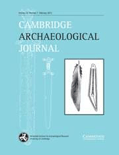
CAMBRIDGE ARCHAEOLOGICAL JOURNAL
Revealing Stories Through Archaeological ExcellenceThe Cambridge Archaeological Journal, published by Cambridge University Press, is a premier academic journal dedicated to archaeology and cultural studies. With an ISSN of 0959-7743 and an E-ISSN of 1474-0540, it has established itself as a leading platform since its inception in 1991, showcasing groundbreaking research that significantly contributes to our understanding of human history and cultural heritage. The journal currently ranks in the top quartile (Q1) across various categories, including Archaeology and Cultural Studies, underlining its impact and relevance in the field. The impact factor reflects its esteemed position, with Scopus ranks placing it within the 90th to 93rd percentiles among its peers. Researchers, professionals, and students alike benefit from its insightful analyses and interdisciplinary approaches, making it an essential resource for advancing knowledge in archaeology and related fields. The journal is based in the United Kingdom, at the Edinburgh Building, Shaftesbury Rd, CB2 8RU, Cambridge, England, and continues to drive scholarly conversations through its commitment to excellence and innovation in archaeological studies.
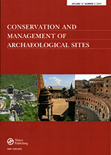
Conservation and Management of Archaeological Sites
Elevating Archaeological Conservation Standards.Conservation and Management of Archaeological Sites is a pivotal academic journal published by Routledge Journals, Taylor & Francis Ltd, focusing on the interdisciplinary fields of archaeology and conservation. With an ISSN of 1350-5033 and an E-ISSN of 1753-5522, this journal strives to publish high-quality research that addresses critical topics related to the conservation and management of archaeological sites, fostering dialogue between practitioners, researchers, and policymakers. Despite being categorized in the third quartile (Q3) across multiple relevant categories such as Archaeology and Conservation in the 2023 rankings, it remains a significant resource for professionals seeking to enhance their understanding and application of best practices in site management. The journal plays a crucial role in disseminating knowledge that contributes to the preservation of cultural heritage, making it an essential read for anyone involved in these vital fields. Published since 1995, the journal not only reflects the growing importance of archaeology in today's society but also provides a platform for emerging research that will shape future conservation strategies.
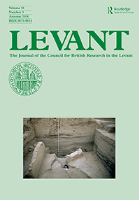
Levant
Exploring the Rich Tapestry of the Levant's PastLevant is a prestigious academic journal published by Routledge Journals, Taylor & Francis Ltd, focusing on the fields of Archaeology and History. Since its inception in 1969, the journal has become a vital platform for researchers, professionals, and students interested in Middle Eastern studies, presenting high-quality research that reflects the rich cultural and historical tapestry of the Levant region. With an impressive impact factor and classified as Q1 in both Archaeology and History, Levant showcases innovative scholarship that pushes the boundaries of knowledge while maintaining rigorous academic standards. Although it is not an open-access journal, its articles are widely accessible through libraries and academic institutions, ensuring a broad reach for its impactful publications. With ongoing research converging from 1969 through to 2024, Levant remains a cornerstone for advancing academic discourse and exploration in relevant historical narratives.
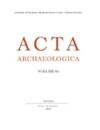
ACTA ARCHAEOLOGICA
Fostering Dialogue in Archaeological ScholarshipACTA ARCHAEOLOGICA is a highly regarded, peer-reviewed journal published by BRILL, focusing on the dynamic field of archaeology. With an ISSN of 0065-101X and an E-ISSN of 1600-0390, this journal disseminates innovative research, critical analyses, and comprehensive reviews that contribute to our understanding of human history, cultural heritage, and archaeological methodology. ACTA ARCHAEOLOGICA has excelled in its field, achieving a Q1 ranking in both the Arts and Humanities and Social Sciences categories for 2023, showcasing its impact and relevance in scholarly discourse. Though not currently open access, the journal caters to a diverse audience of researchers, professionals, and students, offering invaluable insights into archaeological studies from a global perspective. As it continues to foster academic dialogue, ACTA ARCHAEOLOGICA remains a cornerstone for those looking to deepen their knowledge and engage with cutting-edge archaeological research.
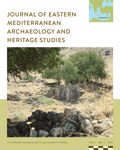
Journal of Eastern Mediterranean Archaeology and Heritage Studies
Connecting Past and Present Through Scholarly ExplorationJournal of Eastern Mediterranean Archaeology and Heritage Studies, published by Penn State University Press, is a premier academic journal dedicated to the exploration and understanding of the archaeological and heritage landscapes of the Eastern Mediterranean region. With an ISSN of 2166-3548 and an E-ISSN of 2166-3556, this journal serves as an essential resource for researchers, professionals, and students in the fields of archaeology, conservation, and heritage studies. Its notable impact is reflected through its Q2 category rankings in both Archaeology and Conservation, coupled with commendable Scopus rankings, positioning it within the top quartiles of its disciplines. The journal not only fosters scholarly dialogue by publishing cutting-edge research but also aims to bridge the gap between academic inquiry and practical conservation efforts. As the field continues to evolve, this journal provides a vital forum for disseminating knowledge and advancing the preservation of cultural heritage, making it indispensable for all engaged in the study of the Eastern Mediterranean’s rich archaeological heritage.

Rossiiskaya Arkheologiya
Illuminating the Rich Tapestry of Human HeritageRossiiskaya Arkheologiya, published by IZDATELSTVO NAUKA, stands as a leading academic journal in the field of archaeology and history, renowned for its commitment to advancing scholarly discourse and research in these vital humanities disciplines. With an impressive Impact Factor and a distinguished position as a Q1 journal in both archaeology and history for 2023, it ranks among the top tier of academic publications, reinforcing its reputation within the scientific community. The journal features a diverse array of studies focusing on archaeological methodologies, historical analyses, and cultural heritage, fostering collaboration and knowledge exchange among researchers, professionals, and students alike. While access to its rich repository of insights is through a traditional subscription model, the journal’s contribution to the archaeological narrative not only elevates current research practices but also propels future inquiries within the Russian Federation and beyond. Addressing critical questions and dialogues within its scope from 2017 to 2023, Rossiiskaya Arkheologiya serves as an essential resource for anyone dedicated to exploring the complexities of human history through material culture.